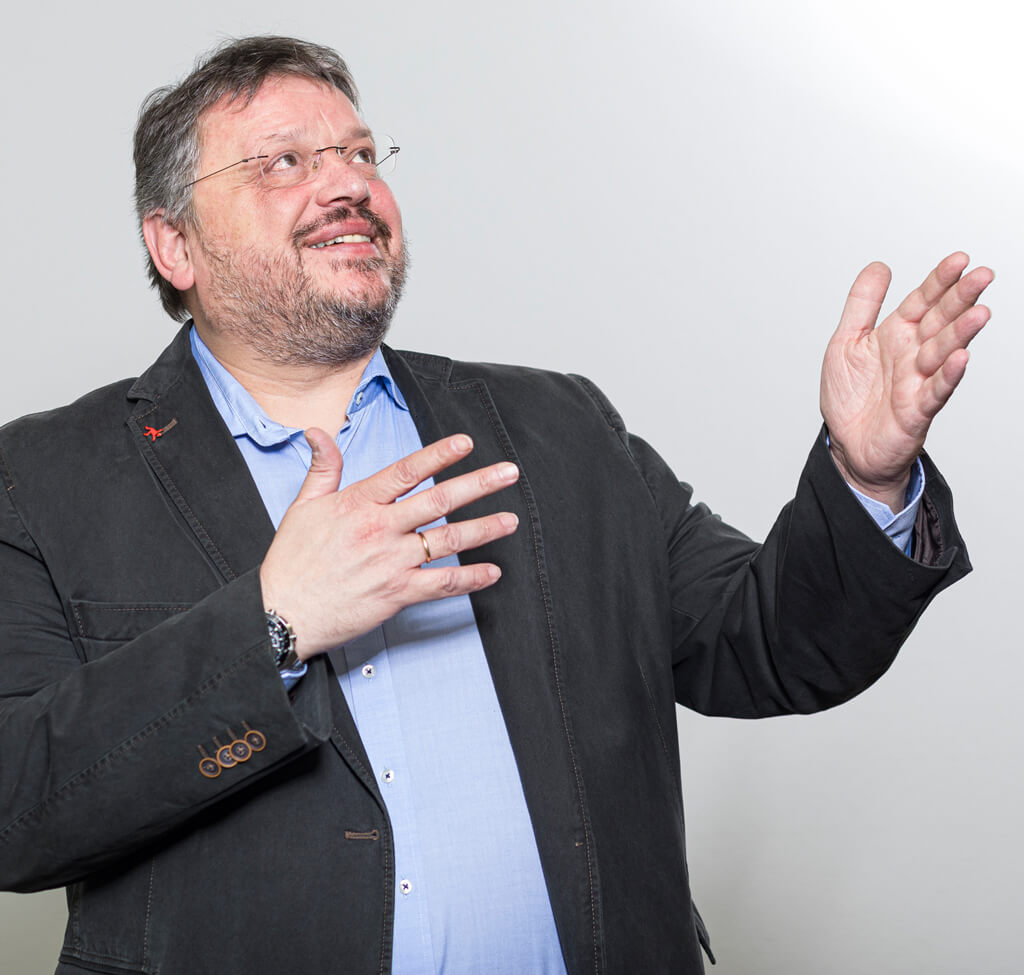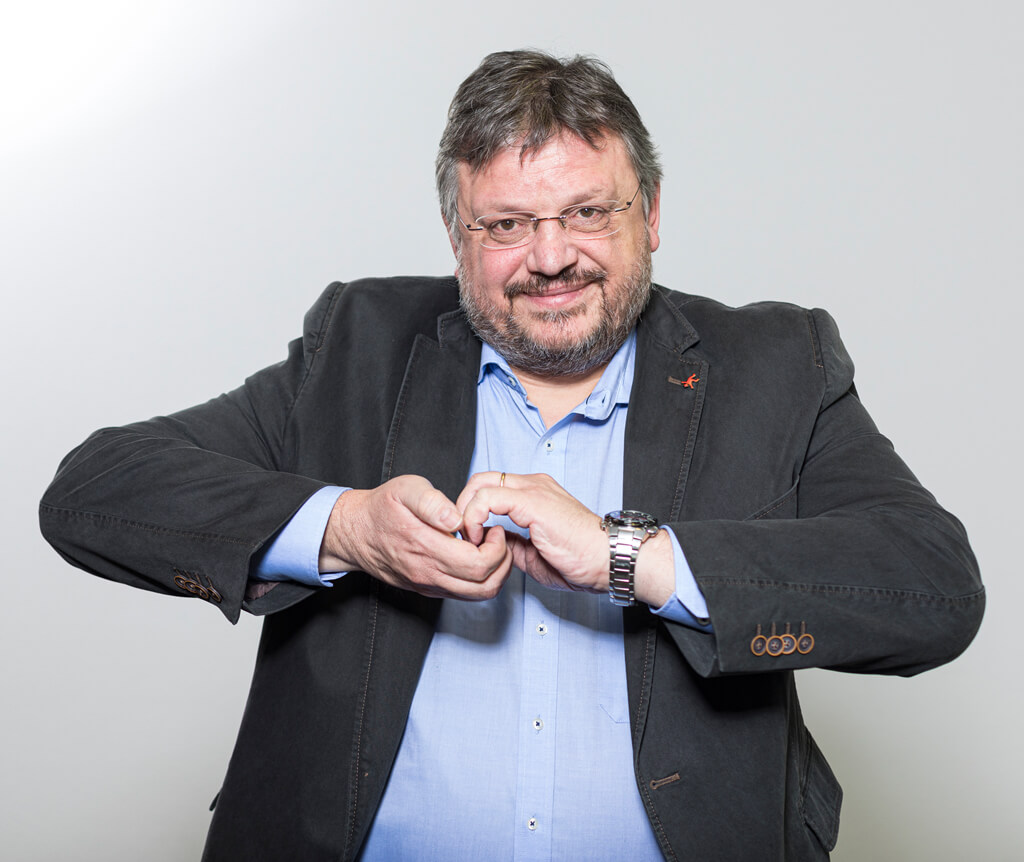Interview
Sector coupling is not just a buzzword, but an absolute necessity.
Interview with Andreas Rimkus, Member of the Bundestag, on the progress of the energy transition conducted by Alexander Land, OGE
Where does Germany stand in the energy transition?

I believe that — as of December 2019 — we have come a very long way. The UN climate protection agreement signed in Paris aims to limit global warming to no more than two degrees by 2050, and if possible, to keep it below 1.5 degrees. We have done well, I believe, in managing to agree on comprehensive climate protection legislation. This places a certain responsibility on the federal ministries, which they can no longer wriggle out of. Each department now has to deal with the tasks that fall within its own area of responsibility and make its own contribution to achieving climate goals. Not only have the German climate protection objectives been agreed on a political level, but they have also now been set out precisely in law for the first time. The efforts made by the federal ministries to achieve these objectives can therefore undergo judicial review, which provides huge leverage, and now the federal government is adding further legislation as part of the climate package. Over the course of the next 1 ½ – 2 years, as long as we remain in the grand coalition, we will launch further special legislation and develop laws for implementation as well as the necessary tools to really do something to ensure we’re on the right path. So I’m really confident in that regard.
It’s now clear to everybody that the 2020 goals will not be achieved. For the 2030 goals, nobody is yet daring to make any predictions. Do we have sufficient momentum to progress quickly enough?

No, I don’t think so. We definitely need to make up some ground there. Climate legislation is just the foundation on which we are now able to shape climate protection and the energy transition with greater ambition. That’s something we can see, for example, in the CO2 price. Some people say it’s too high, others too low, and for others still it is just right. I say it’s a starting point, but as such it’s still not much of a signal to the market. That means it’s still not well understood within the economy just how to deal with it, but improvements have already been made here through the mediation committee of the Bundestag and the Bundesrat.
Are politicians setting the right guidelines? We already touched upon climate protection legislation as a foundation. Is it enough?
I believe it’s enough in that it shows all political actors what is required. I often get the impression that market players are way ahead of politics in this country. If, for example, you take a look at the letters from different organisations, whether they are involved in environmental protection, consumer protection, the energy industry or manufacturing, they all say more needs to be done, and I think they’re right. I’ll give you an example: I am on the supervisory board for the airport here in Düsseldorf, and we have actually decided on the days when Düsseldorf airport will become climate neutral in 2035 and CO2-free in 2050. That’s not merely an idea, but an actual resolution by the supervisory board.
We are writing this in early December 2019. Do you think the federal government’s climate package failed in the Bundesrat last week? The federal states have called on the mediation committee for parts of the climate package, so does that basically mean that everything might ultimately be called into question again?
Yes, it does, but that’s all part of federalism. If the federal government orders the states to do something and they have to pay for it, then of course they’re going to have a problem with it. The same would apply the other way around. The fact that parts of the federal government’s climate package are now being disputed by the states and are having to go to the mediation committee is a very normal part of legislating at national level. In November we were still exploring the direction in which climate and energy policy could go. Now, in December, we have some clarity, and I say that very plainly to the coalition partners too. We have to make progress on climate protection so that we set the right course for industry and the economy.
Is hydrogen just a craze, a new idea to be paraded about?

No, most definitely not. Hydrogen, the first of the elements, offers the perfect physical possibilities for incorporating a variety of energies and particularly electricity via the route of electrolysis, and thus balancing out the volatilities we have in the area of electricity. By that I mean shifting from day to night or from summer to winter, evening out the peaks and troughs, so to speak. We have the pipes available, into which hydrogen can be fed. We have caverns available for long-term storage of hydrogen. Hydrogen will play an important role. We will no doubt conceivably see hydrogen in aviation too, and in freight traffic and in public transport, and we will undoubtedly see it within the system overall as a buffer for the power supply.
What are you expecting from the hydrogen strategy of the Federal Ministry for Economic Affairs and Energy?
I’m expecting two things: Firstly, that it comes quickly. Peter Altmaier had promised it will be ready in December of this year. Now we know it will not be before January 2020, but it has to happen eventually because the economy is waiting for it. And secondly, I expect specific indications of the areas in which Mr Altmaier wants to tackle problems through regulation. Because we know we will only see hydrogen used on a major industrial scale if we support its inclusion in the system through regulation and legislation.
There’s another buzzword doing the rounds too: sector coupling. How do hydrogen and sector coupling fit together?

They fit together perfectly! I come from North Rhine-Westphalia, from Düsseldorf. I myself am actually a master electrician and I build power grids. A power grid forms the link between the power station and the plug socket. This is a form of coupling, but it is also coupling when we use plug systems, in fact, when we plug things in. And if coupling can now take place between sectors, because we have designed the power supply in such a way so that we not only generate power, but also utilise the process heat from the gas-fired power stations and use it for district heating, then this too is sector coupling. And then, we just have the next step, when we say: “OK, everything we collect from currents today and do not use directly is channelled into our energy system via the hydrogen route and makes a huge contribution within the sectors to security of supply and climate goals.” Sector coupling is not a buzzword, but rather an urgent necessity. We will have to bring the sectors together because otherwise we will fail to achieve our energy and climate policy objectives. We have to go beyond the existing business cases, beyond the limitations of the individual sectors.
Very specifically once again: Is the proposed CO2 price too high, too low, or is the path that’s been indicated exactly the right one?
Some people think it’s too high, others too low. My personal view is this: It’s right that we’ve made a start. In the medium term a price of ten euros (now 25 euros) is of course not enough, but pursuing the path we have indicated does mean this: We are making a small start and will then continue onwards until we have reached a level that makes a notable impact in terms of control, and at the same time we will supplement this with measures to ease the burden on consumers. Part of this, for example, is the commuter allowance and the mobility supplement for people who don’t have to pay income tax. This shows that we are sending out a signal to the market, on the one hand, while on the other we are aiming to ease the burden on those who are reliant on getting about using conventional fuels, who are not able to afford the fuel switch because the innovative technologies for this are not sufficiently available. For industry, meanwhile, it is a clear signal that we are serious about the issue. Nevertheless, I would like to see the CO2 price supplemented with an admixture quota for fuels and a GHG (greenhouse gas) quota for combustible fuels.
You travelled to this interview in your own vehicle. What kind of vehicle do you have?
It’s one with two wheels, it’s an electric scooter. So it’s basically a proper scooter with a top permitted speed of 70 and a large number plate with the marks showing it’s electric. Here in Düsseldorf I can use it in the special lanes for greener vehicles too. It’s really convenient these days.
How do you see the mobility of the future?
The mobility of the future is more intense. People want to be mobile; they will own ever fewer cars but will have ever more options for mobility at their fingertips, with a full offering from the first to the final mile. It will be app-based, and people will find the right option for themselves and their mobility requirements via smartphone and will thus be satisfied. Local public transport will play a role in the future, as will very small vehicles like this mini-scooter. These are all things we will see more and more. The mobility of the future is democratic in nature and is to a large extent publicly accessible and shared.
One polarising topic in Düsseldorf right now is the special lanes for environmentally friendly vehicles. What’s your stance in this debate?

I believe unequivocally that we have to act. Deutsche Umwelthilfe (Environment Action Germany) successfully took legal action in the administrative court concerning the issue of NOX (nitrogen oxides) on the roads, where we are constantly exceeding the limitations. Action had to be taken, so the district authorities sat down with the provincial government, with both the CDU and FDP represented of course. The Social Democratic mayor of the city with his traffic-light coalition decided, together with the federal state authorities, that it would be wise to avoid a ban on diesel within the area, and instead introduce special lanes for greener vehicles, the line of thought being that it is wiser to control the number of vehicles entering the city centre than trying to control the problem once they are in the city centre. Otherwise, this would have meant a ban for 55,000 private vehicles and their owners in Düsseldorf. These are all vehicles that do not meet the Euro 6 standard, plus on top of that the same number of commuter vehicles. The fact is, we have 300,000 authorised vehicles in Düsseldorf, plus 280,000 that come from outside the city every day. That means that almost 100,000 would not have been able to enter the city at all. That’s why we said that before that comes into force, we would rather ensure that specific vehicles are targeted and channelled into the city via the special lanes.
Are there any statistics on this already? Have the NOX levels dropped significantly?
Yes, we already have the first findings from the measuring stations, i.e. where the court actually said that the levels have to be reduced, and the NOx levels have gone down. Whether or not NOX levels have been reduced enough so that we remain within the limits every day, I don’t yet know. The experiment is to take place over the course of one year, so that’s how long we’ll have to wait to be able to get truly significant data for comparison. The concern here is also for the health of affected residents, who often live on streets where the rents are still affordable. These tenants have the right to be able to breathe clean air.
What is your personal contribution towards achieving climate goals?
I am making two contributions. On the one hand, I’m making sure that I am careful in the way I use the energies available to me. I make sure that the gas heating in my house is only switched on when it is absolutely necessary. On the other hand, I ensure that I compensate for my mobility behaviour. I can’t always control which mode of transport I use because I frequently have to fly between Düsseldorf and Berlin, especially since time is often an extremely limiting factor. The electric scooter I use around Düsseldorf is supplied with solar power from my house.
How do you offset emissions?
I support climate projects in Kenya and Nigeria. These projects fund solar-powered ovens and provide them to local people.
Thank you for talking to us.